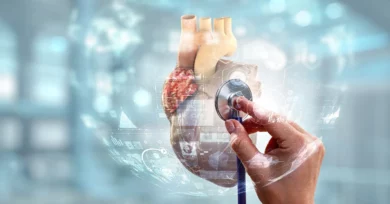The sound you hear while food, liquid, or gas passes through your stomach and small intestine is referred to in medicine as borborygmus. Bloating, constipation, and diarrhea are common symptoms of borborygmi. Many people often have a growling stomach. Your body may be concealing a more severe underlying medical condition with its efforts to convey hunger. Here, we will discuss how to stop stomach growling and more.
Your digestive system undergoes a cycle that lasts around two hours, even when empty. With peristalsis, the digestion process is complete. The digestive system’s muscles contract to carry food, liquids, and gas through the digestive tract. Peristalsis is common, although it may produce Stomach Growling.
Why Is My Stomach Growling?
Following is a discussion of a few of the reasons for stomach growling.
Digestive aid
When food reaches the small intestine, the body secretes enzymes to help digestion and nutritional absorption. Down a process known as peristalsis, the muscles contract in waves to move food down the digestive tract. The passage of gas and partially digested food may cause the rumbling and growling sounds produced by borborygmi.
Symptom of hunger
Peristalsis typically still happens when the body hasn’t eaten in many hours. The digestive system also secretes acids and enzymes into the stomach and intestines to digest food. The noises may happen once per hour until the meal is finished, and they may continue for up to 20 minutes.
Core issues
Stomach growling may indicate a more severe medical condition if accompanied by other symptoms such as pain, discomfort, constipation, or diarrhea. These problems might cause that uneasy stomach growling:
- food allergies
- food intolerances
- gastrointestinal sickness
- intestinal obstruction
- IBS is an abbreviation for uneasy stomach.
Why does my stomach growl when I’m not hungry?
If your stomach is growling, but you aren’t hungry, you may have eaten too much, too quickly, or incorrectly. If you are not hungry yet, your stomach is growling, and stress or anxiety may be at fault.
Your stomach may be making gurgling sounds due to irritable bowel syndrome, food allergies, an intestinal blockage, or an intestinal infection, particularly if these symptoms include bloating, abdominal pain, diarrhea, or constipation.
Can Colon Cancer Make Your Stomach Growl?
One sign of colon cancer is a stomach growling. If any of the following symptoms occur along with your stomach growling, get emergency medical help from a gastroenterologist or other healthcare professional:
Internal bleeding symptoms
- Abdominal gas
- The feeling of nausea and illness
- Obstacles to passing stool
- Heartburn
- Change in Appearance
How to stop stomach growling?
Your stomach grumbling is a typical sign of digestion and seldom means anything serious. You may try the following methods to stop stomach growling if it isn’t caused by anything more serious.
Eat
Stomach Growling Is a Sign of Hunger or Low Blood Sugar. So fill your face if you haven’t eaten in a while! Eating a quick, wholesome snack may reduce or eliminate stomach noises. Smaller, more frequent meals may be beneficial for those who often have stomach rumblings.
Eat slowly and chew everything well
Eating slowly helps with digestion and stops stomach growling before it even begins. The digestive process will start in your mouth even before you swallow. Until this occurs, the digestive process cannot continue.
It would be best if you tried to eat more slowly. We advise taking longer pauses between bites and giving food more time to dissolve in your mouth fully. The air you swallow when eating may be decreased by chewing food completely and eating more slowly. As a result, you should have less gas in your stomach and fewer growling stomach symptoms.
Consume Water
When the body is properly hydrated, it performs at its peak. Before a meal, drinking water might help you feel satisfied and reduce your appetite.
Large water sips may cause the lungs to breathe in too much air. Drinking small amounts of water often will stop the stomach from growing. Drinking water before, after, or between meals is advised, but restricting water consumption during meals may enable the digestive enzymes to function more efficiently.
Unbeknownst to some, Denver’s water is poisoned at higher levels than the Environmental Working Group (EWG) deems tolerable.
Lower Anxiety
Stress and anxiety are typical causes of stomach growling, diarrhea, and stomach discomfort. To stop your stomach growling, try to relax your body and mind. Traditional methods for relaxing the mind and regaining balance include yoga and meditation.
Sleeping well (preferably between 7 and 8 hours) is also essential for reducing stress. Turn off all gadgets at least two hours before night if you want better sleep (and less blue light in your bedroom). Try wearing blue light-blocking glasses after sunset to help your body become even more calm.
One easy way to decompress is to spend time outside. Anxiety has been connected to time spent in natural environments. It’s important to take care of oneself regarding stress and worry. Stress and anxiety are the root causes of many ailments, including those that cause stomach growling.
Eat Less Food That Causes Gas
Certain foods produce more gas than others do. You can stop your stomach growling by being aware of the things you consume that cause gas. Beans surely create gas, but you may be shocked to discover about these other foods that do the same:
- Onions
- Brussels-grown radishes
- Broccoli
- Cauliflower
- Cucumber
- Mushrooms
- Lentils
- Peas
- Milk products
- Drinks that fizz
- Beer
Eat less acidic food in your diet | How To Stop Stomach Growling
Acidic foods may increase the amount of acid your stomach produces. Some examples are citrus and other fruits, tomatoes, and spicy foods. Although increased stomach acid is necessary for digestion, it may cause more frequent stomach growling.
A too-acidic meal may irritate your stomach’s lining, which might hasten the digesting process (peristalsis). Always keep in mind that avoiding acidic foods can be helpful to stop stomach growling.
Limit your alcohol consumption
Drinking alcohol is another item that could aggravate your GI tract and cause that growling feeling. Abdominal grumbling and other gastrointestinal discomfort symptoms may be brought on by stomach inflammation and alcoholic gastritis. To stop your stomach growing, you must limit your alcohol consumption.
Engage with Exercise
After eating, you must walk to help your stomach empty, and your digestion gets going. Take a 20-minute walk to help you digest after 15 minutes after eating. Remember that vigorous exercise after eating may have the opposite impact, so stick to strolling. Digestion is only one of the many health areas that benefit from physical exercise.
Avoid consuming meals and drinks that make you gassy | How To Stop Stomach Growling
Some foods and beverages cause gas, and then there is everything else. Avoiding these meals and beverages may help with borborygmi if stomach growling is brought on by significant volumes of gas passing through the digestive system.
Examples of meals and beverages that might cause gas include:
- Beans
- Beer
- Broccoli
- Brussels-grown radishes
- Cabbage
- Cauliflower
- Lentils
- Mushrooms
- Onion
- Peas
- sodas
You need to remove that meal or drink to stop your stomach growling, causing your stomach to growl and rumble.
Discover food sensitivities | How To Stop Stomach Growling
Dietary intolerances may cause excessive gas and stomach growth in certain persons. Lactose intolerance is mostly brought on by a deficiency in the enzyme lactase, which helps in lactose digestion. Lactose intolerance affects around 65% of people, and the rate varies significantly by race and ethnicity.
The easiest way to handle a food intolerance is to avoid the aggravating foods. People who have frequent stomach growling should speak with their doctor about the likelihood of a food intolerance.
Learn to eat less
After consuming large meals, especially those high in fats, sweets, red meats, and other potentially difficult-to-digest items, it may become more difficult to stop stomach growling and other sounds. Eating smaller meals more often and correctly digesting food while eating may help prevent overeating.
Take care of gastrointestinal issues
More serious underlying medical conditions, including infection or intestinal blockage, may cause borborygmi. Consequently, it is important to contact a doctor for a correct diagnosis and treatment plan if stomach rumbling persists and is accompanied by additional symptoms.
Additionally, IBS is typically the cause of stomach growling, and treating this underlying issue could be the only way to stop these noises.
Conclusion | How To Stop Stomach Growling
Although you may not like the sound of your stomach grumbling and growling, it is quite normal. These methods may stop stomach growling when you have hungry pains, loud digestion, or indigestion.
Make an appointment with your doctor if you often have abdominal discomfort, nausea, or diarrhea combined with constant stomach growling from indigestion. Irritable bowel syndrome (IBS), gastroparesis, or something considerably more serious are examples of potential causes.






